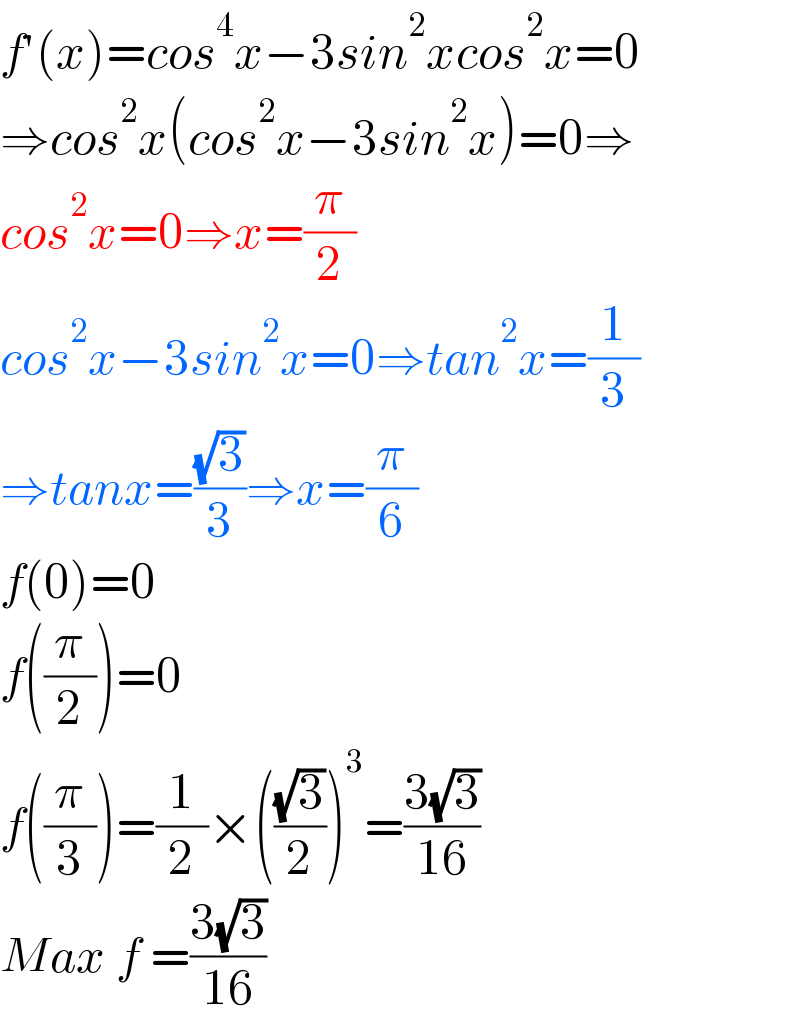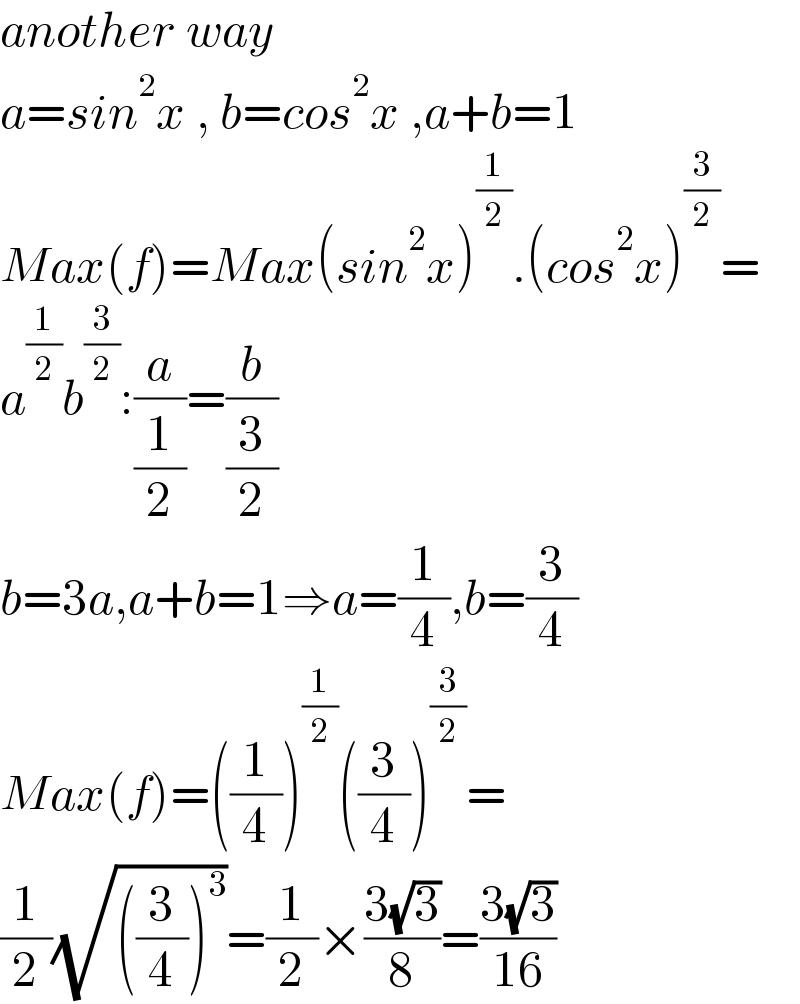
Question Number 174267 by mnjuly1970 last updated on 28/Jul/22
![Q:: Find the value of : Max_( x∈ [ 0 , (π/2) ]) { sin (x ). cos^( 3) ( x )∣ }=?](Q174267.png)
$$ \\ $$$$\:\:\:\:\:\:\:\:\mathrm{Q}::\:\:\mathrm{Find}\:\:\:\mathrm{the}\:\:\mathrm{value}\:\:\mathrm{of}\:: \\ $$$$\:\:\:\:\:\:\:\:\:\:\:\:\:\:\:\: \\ $$$$\:\:\:\:\:\:\:\:\:\:\:\:\:\:\:\:\:\mathbb{M}\mathrm{ax}_{\:{x}\in\:\left[\:\mathrm{0}\:,\:\frac{\pi}{\mathrm{2}}\:\right]} \:\:\left\{\:\mathrm{sin}\:\left({x}\:\right).\:\mathrm{cos}^{\:\mathrm{3}} \left(\:{x}\:\right)\mid\:\:\right\}=?\:\:\:\:\:\:\:\:\: \\ $$$$\:\:\:\:\:\:\:\:\:\:\:\:\:\:\:\:\:\:\:\:\:\: \\ $$$$\:\:\:\:\: \\ $$
Commented by kaivan.ahmadi last updated on 28/Jul/22

$${f}'\left({x}\right)={cos}^{\mathrm{4}} {x}−\mathrm{3}{sin}^{\mathrm{2}} {xcos}^{\mathrm{2}} {x}=\mathrm{0} \\ $$$$\Rightarrow{cos}^{\mathrm{2}} {x}\left({cos}^{\mathrm{2}} {x}−\mathrm{3}{sin}^{\mathrm{2}} {x}\right)=\mathrm{0}\Rightarrow \\ $$$${cos}^{\mathrm{2}} {x}=\mathrm{0}\Rightarrow{x}=\frac{\pi}{\mathrm{2}} \\ $$$${cos}^{\mathrm{2}} {x}−\mathrm{3}{sin}^{\mathrm{2}} {x}=\mathrm{0}\Rightarrow{tan}^{\mathrm{2}} {x}=\frac{\mathrm{1}}{\mathrm{3}} \\ $$$$\Rightarrow{tanx}=\frac{\sqrt{\mathrm{3}}}{\mathrm{3}}\Rightarrow{x}=\frac{\pi}{\mathrm{6}} \\ $$$${f}\left(\mathrm{0}\right)=\mathrm{0} \\ $$$${f}\left(\frac{\pi}{\mathrm{2}}\right)=\mathrm{0} \\ $$$${f}\left(\frac{\pi}{\mathrm{3}}\right)=\frac{\mathrm{1}}{\mathrm{2}}×\left(\frac{\sqrt{\mathrm{3}}}{\mathrm{2}}\right)^{\mathrm{3}} =\frac{\mathrm{3}\sqrt{\mathrm{3}}}{\mathrm{16}} \\ $$$${Max}\:{f}\:=\frac{\mathrm{3}\sqrt{\mathrm{3}}}{\mathrm{16}} \\ $$
Commented by mnjuly1970 last updated on 28/Jul/22

$$\:\:\:\:\:{thanks}\:{alot}\:{sir} \\ $$$$\:\:\:{also}\:...\frac{\mathrm{3}\sqrt{\mathrm{3}}}{\mathrm{16}}\:\:\:\:\:\:{typo} \\ $$
Commented by kaivan.ahmadi last updated on 28/Jul/22

$${another}\:{way} \\ $$$${a}={sin}^{\mathrm{2}} {x}\:,\:{b}={cos}^{\mathrm{2}} {x}\:,{a}+{b}=\mathrm{1} \\ $$$${Max}\left({f}\right)={Max}\left({sin}^{\mathrm{2}} {x}\right)^{\frac{\mathrm{1}}{\mathrm{2}}} .\left({cos}^{\mathrm{2}} {x}\right)^{\frac{\mathrm{3}}{\mathrm{2}}} = \\ $$$${a}^{\frac{\mathrm{1}}{\mathrm{2}}} {b}^{\frac{\mathrm{3}}{\mathrm{2}}} :\frac{{a}}{\frac{\mathrm{1}}{\mathrm{2}}}=\frac{{b}}{\frac{\mathrm{3}}{\mathrm{2}}} \\ $$$${b}=\mathrm{3}{a},{a}+{b}=\mathrm{1}\Rightarrow{a}=\frac{\mathrm{1}}{\mathrm{4}},{b}=\frac{\mathrm{3}}{\mathrm{4}} \\ $$$${Max}\left({f}\right)=\left(\frac{\mathrm{1}}{\mathrm{4}}\right)^{\frac{\mathrm{1}}{\mathrm{2}}} \left(\frac{\mathrm{3}}{\mathrm{4}}\right)^{\frac{\mathrm{3}}{\mathrm{2}}} = \\ $$$$\frac{\mathrm{1}}{\mathrm{2}}\sqrt{\left(\frac{\mathrm{3}}{\mathrm{4}}\right)^{\mathrm{3}} }=\frac{\mathrm{1}}{\mathrm{2}}×\frac{\mathrm{3}\sqrt{\mathrm{3}}}{\mathrm{8}}=\frac{\mathrm{3}\sqrt{\mathrm{3}}}{\mathrm{16}} \\ $$
Commented by infinityaction last updated on 28/Jul/22

$${how} \\ $$$$\frac{{a}}{\frac{\mathrm{1}}{\mathrm{2}}}\:=\:\frac{{b}}{\frac{\mathrm{3}}{\mathrm{2}}} \\ $$
Commented by mnjuly1970 last updated on 28/Jul/22

$$\:{because}\:\:{a}+{b}={cte} \\ $$$$\:\:\:\:\:\: \\ $$
Commented by kaivan.ahmadi last updated on 28/Jul/22

$${proposition}:\: \\ $$$${if}\:{a},{b}>\mathrm{0}\:{and}\:{a}+{b}={k}>\mathrm{0}\:\:\left({cte}\right) \\ $$$$\Rightarrow{Max}\:\left({a}^{{m}} .\:{b}^{{n}} \right):\:\frac{{a}}{{m}}=\frac{{b}}{{n}} \\ $$
Commented by Tawa11 last updated on 28/Jul/22

$$\mathrm{Great}\:\mathrm{sirs} \\ $$
